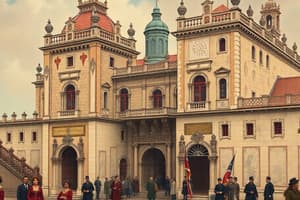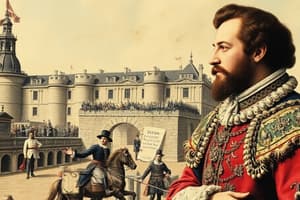Podcast
Questions and Answers
On what date did the city of Paris find itself in a state of alarm, marking the beginning of the French Revolution?
On what date did the city of Paris find itself in a state of alarm, marking the beginning of the French Revolution?
July 14, 1789
What was the Bastille and why was it hated by the people of Paris?
What was the Bastille and why was it hated by the people of Paris?
It was a fortress-prison that stood for the despotic power of the king.
What were the people primarily protesting against in Paris and the countryside during the French Revolution?
What were the people primarily protesting against in Paris and the countryside during the French Revolution?
- The king's lavish spending habits
- The high price of bread (correct)
- The lack of political representation
- The influence of the Church
Who ascended the throne of France in 1774?
Who ascended the throne of France in 1774?
French society in the eighteenth century was divided into two estates, with both estates paying taxes.
French society in the eighteenth century was divided into two estates, with both estates paying taxes.
What was the Old Regime?
What was the Old Regime?
What was the taille?
What was the taille?
What is a subsistence crisis?
What is a subsistence crisis?
What did the middle class believe regarding social privileges during the eighteenth century?
What did the middle class believe regarding social privileges during the eighteenth century?
According to John Locke, what should a government be based on, as expressed in his Two Treatises of Government?
According to John Locke, what should a government be based on, as expressed in his Two Treatises of Government?
According to Montesquieu, what should power be divided into?
According to Montesquieu, what should power be divided into?
Flashcards
The Bastille
The Bastille
A fortress and prison in Paris that was stormed by a crowd in 1789, marking a pivotal event in the French Revolution due to it symbolizing the despotic power of the king.
French Revolution
French Revolution
Social and political unrest in late 1700s France, leading to the end of the monarchy and significant social changes.
Louis XVI
Louis XVI
King during the French Revolution; known for his role in escalating France's debt and ultimately being executed.
Livre
Livre
Signup and view all the flashcards
French Estates
French Estates
Signup and view all the flashcards
Clergy
Clergy
Signup and view all the flashcards
Tithe
Tithe
Signup and view all the flashcards
Taille
Taille
Signup and view all the flashcards
Subsistence crisis
Subsistence crisis
Signup and view all the flashcards
Middle Class
Middle Class
Signup and view all the flashcards
Study Notes
The French Revolution
- On July 14, 1789, Paris was in alarm due to the king's order to move troops into the city fueled by rumors of the army opening fire on citizens.
- Approximately 7,000 people formed a peoples' militia and raided government buildings for arms.
- A group of people stormed the Bastille, a fortress-prison, seeking ammunition.
- The commander of the Bastille was killed and the prisoners were freed, but there were only seven of them.
- The Bastille was hated because it symbolized the king's despotic power and was then demolished, with fragments sold as souvenirs.
- Rioting increased in both Paris and the countryside, mainly protesting the high bread prices.
- Historians view this period as the beginning of events leading to the execution of the King of France.
French Society During the Late Eighteenth Century
- In 1774, Louis XVI of the Bourbon family became the King of France at the age of 20, married to Marie Antoinette.
- Louis XVI found the treasury empty due to long wars and maintaining the Palace of Versailles.
- France, under Louis XVI, aided the thirteen American colonies in gaining independence from Britain, further increasing the french debt by over a billion livres, currency of France.
- Lenders charged 10% interest on loans, forcing the French government to allocate a growing portion of its budget to interest payments.
- To cover expenses for the army, court, and government, the state increased taxes, and French society was divided into three estates, with only the third estate paying taxes.
- French society was divided into three estates, and only the third estate paid taxes.
- The society of estates was part of the feudal system before 1789, known as the Old Regime.
- Peasants comprised roughly 90% of the population, but most didn't own the land they worked on.
- About 60% of the land was owned by nobles, the Church, and wealthier members of the third estate.
- The clergy and nobility had privileges by birth, including exemption from paying taxes.
- Nobles enjoyed feudal privileges, extracting feudal dues, and compelling peasants to provide services, like working on fields, army service or building roads.
- The Church collected tithes (one-tenth of agricultural produce) from the peasants.
- The third estate paid direct taxes (taille) and indirect taxes on everyday items like salt or tobacco.
The Struggle to Survive
- The population of France grew from 23 million in 1715 to 28 million in 1789, increasing the demand for foodgrains.
- Grain production couldn't keep up with demand, causing bread prices to increase.
- Most workers were labourers with fixed wages that did not keep up with rising prices, widening the gap between the poor and the rich.
- Drought or hail worsened conditions by reducing harvests.
- This led to a subsistence crisis, which frequently occurred in France during the Old Regime.
How a Subsistence Crisis Happens
- A bad harvest can cause a disease epidemic.
- The poorest can no longer buy bread through scarcity of grain.
- All of which cause food riots, rising food prices, increased number of deaths and weaker bodies.
A Growing Middle Class Envisages an End to Privileges
- Peasants and workers had revolted against high taxes and food scarcity but lacked the means for social and economic change.
- The middle class emerged in the 18th century, gaining wealth through overseas trade and manufacturing, such as woollen and silk textiles.
- The third estate also included lawyers and administrative officials.
- The middle class believed that social position should depend on merit, not birth privilege.
- Philosophers John Locke and Jean Jacques Rousseau advocated for a society based on freedom, equal laws, and opportunities.
- Locke, in Two Treatises of Government, refuted the divine and absolute right of the monarch.
- Montesquieu, in The Spirit of the Laws, proposed a division of power within the government, between the legislative, the executive and the judiciary.
- This model was implemented in the United States after the thirteen colonies declared independence from Britain.
- The American constitution and its guarantee of individual rights influenced political thinkers in France.
- The ideas of these philosophers were discussed in salons and coffee houses and spread through books and newspapers.
- News of Louis XVI planning to impose more taxes generated anger and protest against the system of privileges.
Studying That Suits You
Use AI to generate personalized quizzes and flashcards to suit your learning preferences.




